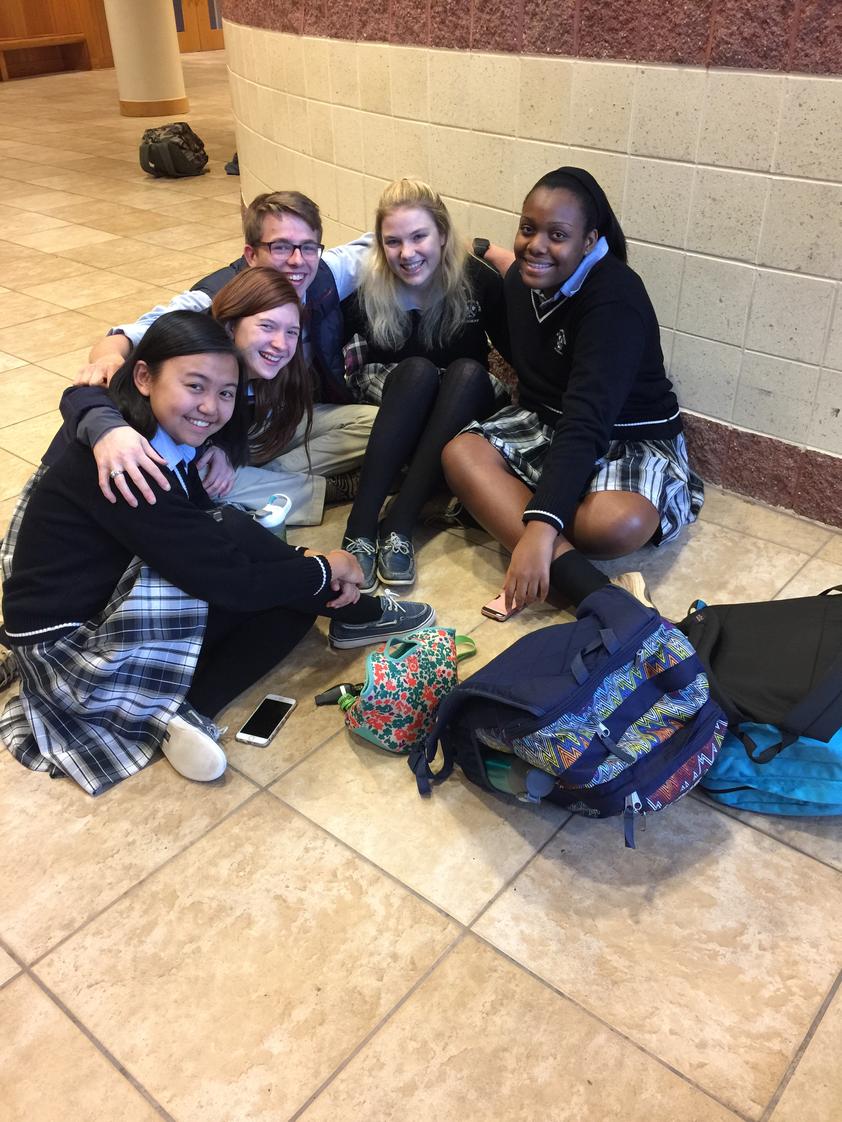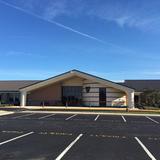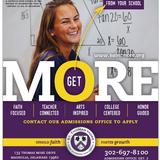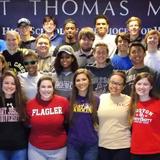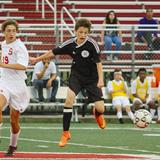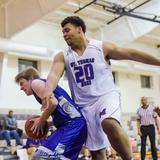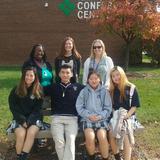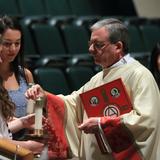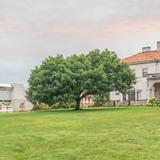St. Thomas More Academy, a Catholic college preparatory school in the Diocese of Wilmington, educates young women and men of all cultural and economic backgrounds for academic excellence using Catholic teachings and Gospel values; promotes integrated arts, community service and athletics; develops individuals, in a safe environment, to share their God-given gifts; and graduates well-rounded citizens.
School Overview
Student Body
Total Students
50 students
Student Body Type
Co-ed
% Students of Color
26%
State avg.: 26%
Students by Grade
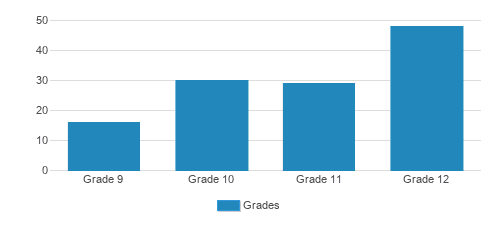
Academics and Faculty
Total Classroom Teachers
9 teachers
Student : Teacher Ratio
6:1
National avg.: 13:1
% Faculty w/Advanced Degree
65%
Average Class Size
15 students
Number of AP Courses
10 courses
Advanced Courses
AP Art, AP Biology, AP Calculus AB, AP English Language and Composition, AP English Literature and Composition, AP Psychology, AP US Government, AP US History
Average SAT score
1130
(Out of 1600)
Average ACT score
25
(Out of 36)
Classroom Dress Code
Formal
Uniforms
Tuition and Acceptance Rate
Admission Deadline
Dec. 1 / rolling
Yearly Tuition Cost
$11,725
Tuition Notes
Merit Scholarships and needs-based Grants/Aid are available.
% on Financial Aid
45%
Average Financial Aid Grant
$1,700
Acceptance Rate
85%
National avg.: 85%
Admissions Director
Dr. Judi L. Coffield
Admissions Associate
Carol Mazuchowski
Sports
Total Sports Offered
10 sports
Sports
Extracurriculars
Total ExtracurricularsTotal Extra-curric.
15 extracurriculars
ExtracurricularsExtra-curric.
Club or Organization:
Campus Ministry Club, Math League, Model United Nations (MUN), National Honor Society (NHS), School Newspaper, Student Ambassador Program, Student Government Association, TV Media Production Club, Yearbook Committee
Arts and Music Programs:
Art Club, Drama Club, Fine Arts Magazine, Instrumental Ensemble, Liturgical Choir, Select Choir
Campus Ministry Club, Math League, Model United Nations (MUN), National Honor Society (NHS), School Newspaper, Student Ambassador Program, Student Government Association, TV Media Production Club, Yearbook Committee
Arts and Music Programs:
Art Club, Drama Club, Fine Arts Magazine, Instrumental Ensemble, Liturgical Choir, Select Choir
School Notes
Our academic program is based on five
pillars that prepare and serve our students:
College Statistics:
Columbia University, University of Pennsylvania, Johns Hopkins University, Brown University, Cornell University, Georgetown University, Carnegie Mellon University, Wake Forest University, University of North Carolina- Chapel Hill, Massachusetts Institute of Technology
Closest major cities: Philadelphia, PA; Baltimore, Maryland; Washington, D.C.
- Weare Faith Focused. Our adherence to the teaching of the Gospels stays central to all of our endeavors. We are empowered by the teaching of the Gospels. Ours is a diverse faith population, with half of our student body joining us from other religious backgrounds.
- We are Teacher Connected. We maintain an intimate teacher-student ratio that ensures all students receive the support and attention necessary to be successful. Our class sizes forge an ideal climate for growth and is a crucial feature of our unique learning environment.
- We are Arts Inspired. Our drama, fine arts, choir, and band programs enjoy great participation, and are thriving components of our student life.
- We are College Centered. We offer a breadth of academic offerings that fully engage and prepare our students for furthering their education. Over 95% of our seniors are college bound. Our 2015 graduating class, comprised of only 66 seniors, was awarded a total of $8.7 million in scholarship monies. Our students have scored a higher SAT average than the state of Delaware and the U.S. between 2011 and 2016.
- We are Honor Guided. Our students are nurtured by ethics, virtue, and duty to others. Students commit a total of 100 volunteer hours to their community as a part of their graduation requirement.
College Statistics:
- College Acceptance Rate: 97%
- SAT (2400 possible points)
- Average: 1557
- STMA students outscored the state average by 189 points
- STMAstudents exceededthe national average by 67 points
Columbia University, University of Pennsylvania, Johns Hopkins University, Brown University, Cornell University, Georgetown University, Carnegie Mellon University, Wake Forest University, University of North Carolina- Chapel Hill, Massachusetts Institute of Technology
Closest major cities: Philadelphia, PA; Baltimore, Maryland; Washington, D.C.
Source: Verified school update
Frequently Asked Questions
How much does St. Thomas More Academy cost?
St. Thomas More Academy's tuition is approximately $11,725 for private students.
What is the acceptance rate of St. Thomas More Academy?
The acceptance rate of St. Thomas More Academy is 85%, which is lower than the national average of 91%.
What sports does St. Thomas More Academy offer?
St. Thomas More Academy offers 10 interscholastic sports: Badminton, Baseball, Basketball, Field Hockey, Golf, Lacrosse, Soccer, Softball, Tennis and Volleyball.
When is the application deadline for St. Thomas More Academy?
The application deadline for St. Thomas More Academy is Dec. 1 / rolling (applications are due on Dec. 1 but additional applications are reviewed year-round as space permits ).
Recent Articles

A Parent's Guide To Understanding High School Teaching Methods
This comprehensive guide helps parents navigate the various teaching methods used in today's high school classrooms. By understanding these approaches, you'll be better equipped to support your teen's learning journey, communicate effectively with teachers, and create a complementary learning environment at home.

February 08, 2025
Social Emotional Learning: Education's Hidden SymphonyA musician's perspective on Social Emotional Learning reveals how this educational framework orchestrates success through five essential emotional competencies.

January 24, 2025
A Roadmap For Starting A Private SchoolUse this roadmap as a set of talking points with your trusted mentors and professionals to start the private school of your dreams. You're not alone. Over the years, hundreds of folks like you have had the same dream. From Quintilian to Maria Montessori to Lucy Madeira Wing, visionary educators have established schools to teach according to their beliefs and methodologies.


